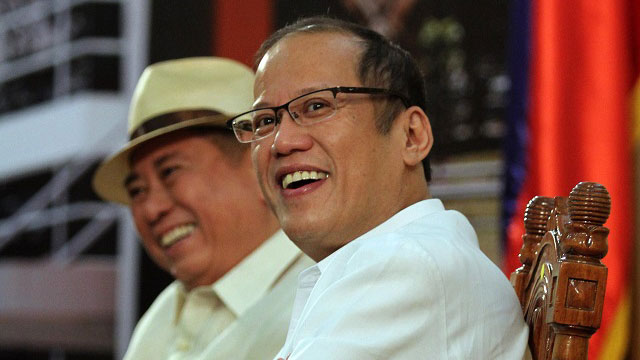SUMMARY
This is AI generated summarization, which may have errors. For context, always refer to the full article.

MANILA, Philippines – As debate persists over a Komisyon sa Wikang Filipino’s (KWF) resolution to change ‘Pilipinas’ to “Filipinas,” President Benigno Aquino III lamented the prevailing “politics of language” in the country today.
During the opening of the first Pambansang Kongreso sa Wika on Monday, August 19, Aquino pointed out the divisions caused by the national language.
When he was still in Congress, he said a debate on the Filipino language lasted two weeks. “Napakaraming inakya’t baba kong dike para lang magkaroon ng pribilehiyong magkaroon ng debateng tila walang saysay,” Aquino shared. (I went up and down many dikes just to have the privilege of a debate that is futile.)
He saw this ironic because of what Filipino stands for: one voice that will unite the Philippine islands.
“Isa sa mga tanong na bumagabag sa dating Pangulong Manuel Quezon noong panahon ng Commonwealth ay ito: ‘Oras na magbalik sa Estados Unidos ang mga Amerikano, at makamit ng Pilipinas ang kalayaan, at wala na muling paghuhugutan ng dahilan ang mga Pilipino para lumaban at magkaisa para sa iisang layunin, ano pa ang magbubuklod sa ating bansa?’ Ang sagot dito: isang wikang pambansa.” (One of the questions former President Manuel Quezon pondered on during the Commonwealth is this: ‘Once the Americans go back to the United States, once the Philippines gain freedom, and upon the absence of any reason for the Filipinos to fight and be united for one goal, what else will unite the country?’ The answer: one national language.)
In 1937, Quezon established Tagalog as the basis of the national language. Criticisms prompted the renaming of “Tagalog” to “Pilipino” in 1959, and from “Pilipino” to “Filipino” in 1973.
READ: In defense of ‘Filipinas’
“Ang isang bagay na dapat ay nagbubuklod sa atin, nagiging mitsa pa ng di-pagkakasunduan. Ang wikang dapat ay bumubuo at tumatahi sa libu-libo nating mga kapuluan, ay siya pang pumupunit sa mga prinsipyong naghuhulma sa ating kasaysayan,” he said.
(The thing that should unite us fuses our disagreements. The language that should complete and weave the thousands of our islands is the very language that tears down the principles that shape our history.)
The Pambansang Kongreso sa Wika, Aquino said, is a step towards addressing the challenges and problems of the language “that have long been neglected in society.”
He also commended the KWF for actively enforcing its mandate of developing the national language.
A Filipino-speaking President
Since Aquino took office in 2010, he has delivered his speeches in Filipino. It was a choice – “and not a gimmick or propaganda” – he made even before he was elected, he said.
He added it was his obligation to speak in the language that his “boss” understands and is more comfortable with.
“Trabaho kong iulat sa kanila kung ano ang totoo, sa paraang simple at pinakanauunawaan ng madla.Higit sa lahat, Filipino ang gamit ko sa tuwing kaharap ang aking mga Boss, dahil alam kong ito ang wikang pinakamalapit sa kanilang puso,” he said.
(It is my duty to report to them the truth, in a manner simple and understandable to the crowd. More importantly, I use Filipino whenever I stand before my bosses because I know this is the language closest to their heart.)
KWF chair Virgilio Almario said in a society where the domains of power – “politicians, businessmen, the rich, and those in power” – do not communicate in Filipino, a Filipino-speaking president like Aquino means a lot.
“Kaya napakalaking bagay na heto, meron kang isang presidente, pinapakita nya na kung gusto nyang makipag-unawaan, ang kanyang gagamitin ay Filipino,” Almario told Rappler.
(It is a big thing that here, you have a president, and he shows you that if he wants to communicate, he will use Filipino.)
In the three-day Pambansang Kongreso sa WIka, experts, scholars, and writers will tackle concrete solutions to develop and promote Filipino and other Philippine languages. – Rappler.com
Add a comment
How does this make you feel?
There are no comments yet. Add your comment to start the conversation.